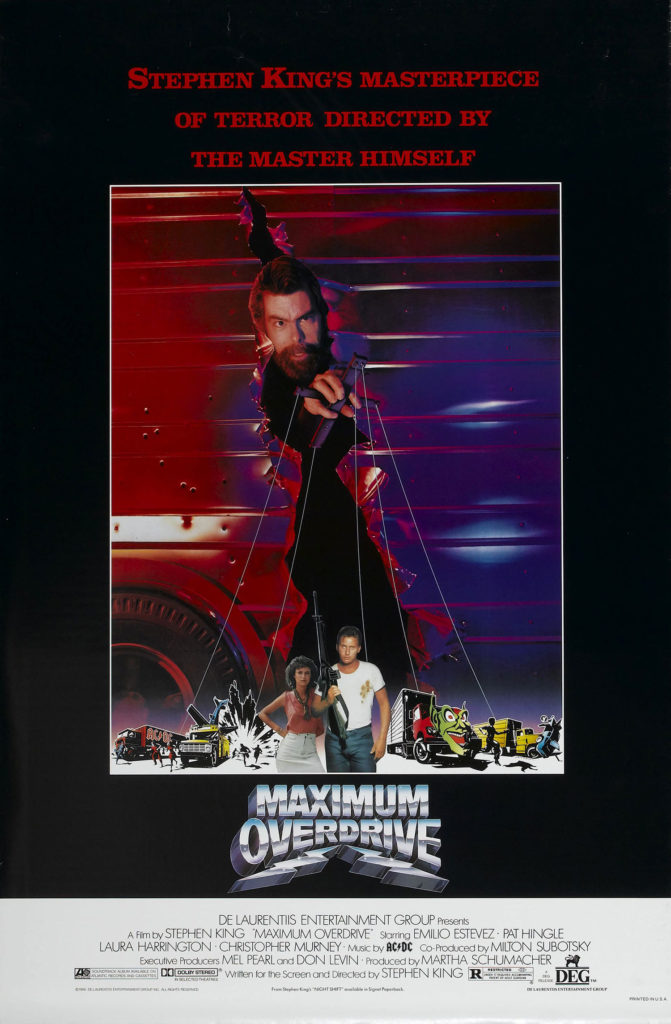“Stephen King’s masterpiece of terror directed by the master himself.” That’s how Maximum Overdrive was billed, right at the top of the poster. There’s an image of a bearded King peaking through a jagged rip in the side of what looks like a horse trailer manipulating characters and events in the movie marionette-style. There they are at the end of his strings, right above the chrome and lightning bolt logo for the film, slave to his every command and victim to every twisted whimsy. The poster implies quite explicitly that every other King adaptation to make it to the big screen was shit. But never fear, the master of horror has blessed this film with his presence — total creative control — ensuring that Maximum Overdrive is the quintessential Stephen King film. Suck on that, Stanley Kubrick.
Maximum Overdrive is a loose adaptation of King’s short story, Trucks, with King taking on the screenwriting duties as well. The Dixie Boy truck stop outside Wilmington, North Carolina, is the setting. There, a small group of people has been trapped inside by machines that have suddenly come to life on their own. Driverless semi-trucks ring the truck stop like bands of wild Indians circling covered wagons in the Hollywood westerns of yore. Woe be to anyone who ventures outside, as the blood spatters on bumpers and grills suggests.
The group is led, to a certain extent, by Emilio Estevez as Billy, a parolee short order cook at the Dixie Boy. In the beginning, he has just as many problems with his boss, the nefarious Hendershot (Pat Hingle), as he eventually encounters with the trucks, but this is just a technique as old as cinema itself. For it is there in all its glory.  Billy is the anti-hero, carrying on the legacy of such stalwart screen giants as James Dean, Marlon Brando, and even, yes, his own father, Martin Sheen (think Badlands). Those are some heavy disestablishmentarian shoes to fill. No worries, though. After all, Estevez had experience by this time with multiple roles cut from the same cloth, as Two-Bit in The Outsiders and Otto in Repo Man. Of the three, Billy is the man I’d want by my side when 18-wheelers catch a yen for human blood.
Billy is the anti-hero, carrying on the legacy of such stalwart screen giants as James Dean, Marlon Brando, and even, yes, his own father, Martin Sheen (think Badlands). Those are some heavy disestablishmentarian shoes to fill. No worries, though. After all, Estevez had experience by this time with multiple roles cut from the same cloth, as Two-Bit in The Outsiders and Otto in Repo Man. Of the three, Billy is the man I’d want by my side when 18-wheelers catch a yen for human blood.
Another classic performance was turned in by Ellen McElduff, who, as waitress Wanda June, delivered a verbal and convulsive attack directed towards the trucks that, once seen, will never be forgotten. Part of me prays this film, and this scene, were tongue-in-cheek. A more sadistic part of me prays they were not.
Maximum Overdrive is a unique film. I have to cut King a lot of slack in his direction. The man clearly had no idea what he was doing. So the fact that the movie was finished at all is a testament to his resolve and determination. After all, even Orson Welles and Terry Gilliam met their respective Waterloos while trying to direct Don Quixote. Totally unrelated to Maximum Overdrive? Perhaps. Or is it? King himself vowed never to direct another film after this one, as if the choice were his to make.
Egregious directorial offenses include holes in the story big enough to drive a truck through (heh-heh), and weird transitions between scenes. Those transitions are bizarrely abrupt, as if the audience is expected to fill in a few seconds here and there on their own. Once or twice could have been overlooked, but in Maximum Overdrive it passes for technique.
It couldn’t have been more than a week into shooting before King realized he was in over his head. Imagine the straight panic that must have been possessing him as he awoke every night in a cold sweat, trying to shake off the disturbing visions of a nightmare that was becoming all too real every day — an eight-figure budget poured into the toilet with little hope of return. What scares the last century’s raconteur of fright? Maximum Overdrive, that’s what.
Maximum Overdrive is better than Alien: Resurrection for one reason and one reason only: it will make you laugh out loud. Alien: Resurrection has been known to make people cry. Crying is no fun. Oh, and AC/DC did the soundtrack. AC/DC Rulez!!!
